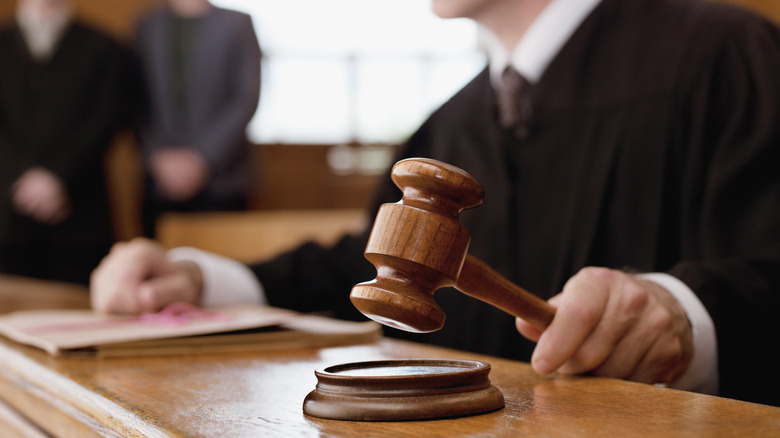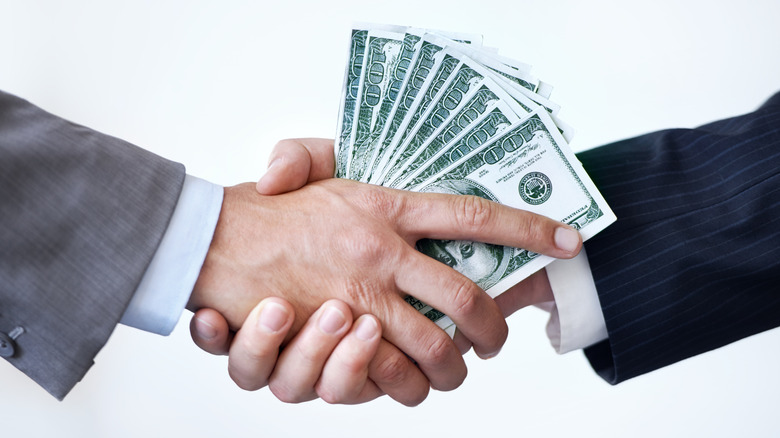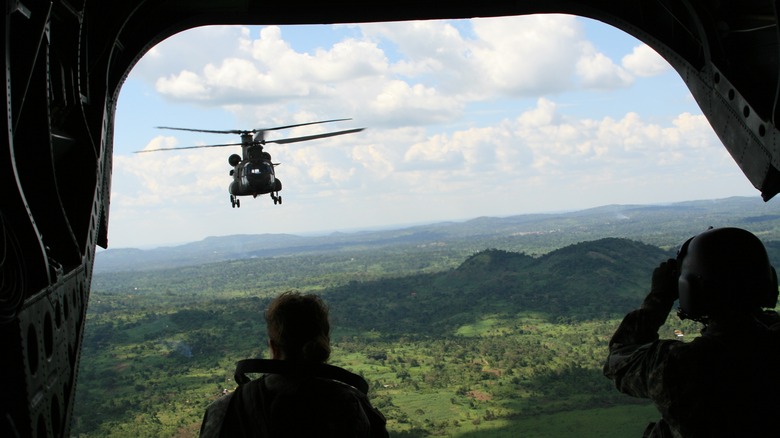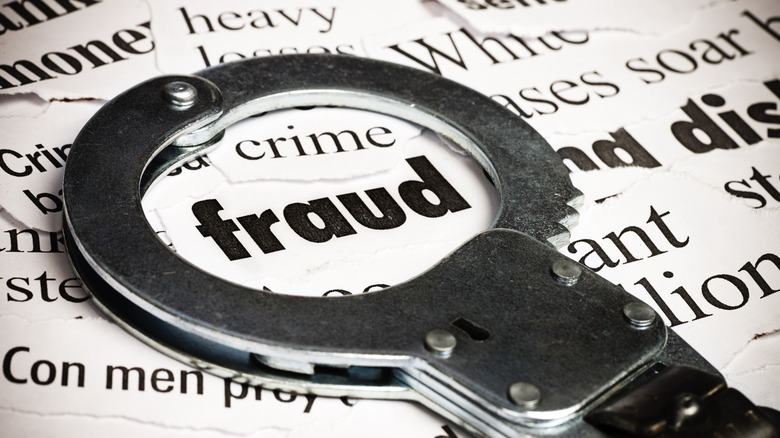Scandals That Have Haunted Boeing Over The Years
If history shows us anything — at least since the 1980s — it's that Boeing can be relied on to have at least one scandal every three to five years or so. The recent 737 MAX fuselage blowout is just the latest in an ongoing series of controversial events. As recently as 2018 and 2019, two deadly airplane crashes caused far worse than a corporate PR nightmare — the deaths of 346 people. From allegations of overcharging the federal government, illegally obtaining classified documents, firing chief officers for shady activities, and wielding insider info to outbid competitors, Boeing's got quite the track record for scandals. In fact, the company's history makes one wonder how it has stayed in business — that is, until one notices its $112 billion value.
In fact, Boeing scandals are so commonplace that Willie Walsh, director of the International Air Transportation Association (IATA), said via Reuters of Boeing's latest 2024 scandal that "they've responded much, much better to this than other events." Setting such optimism aside, let's have a look at some of Boeing's most prominent scandals. Some, because we don't have enough space for all of them.
Pled guilty to passing along classified government documents
Because we might as well move chronologically through Boeing's sordid past, we can start with the first (known) scandal involving all the hallmarks of a classic courtroom drama: secret Pentagon files, courtroom accusations, womp-womp corporate representatives, stern-lipped government officials, and "39 counts of conspiracy and unauthorized conveyance," as The New York Times phrased it back in 1989. What does this mean? It means that Boeing got ahold of some classified government documents and passed them along like napkins at dinner — over 100 documents total from 1979 to 1985.
To be fair, someone had to give said documents to Boeing. But that person — Richard Lee Fowler — told Judge Albert V. Bryan in 1990 (via the Los Angeles Times), "I am here today for doing a job I was hired to do by one of the Fortune 500 companies." And indeed, Fowler worked for Boeing as a senior marketing analyst (not document thief), and before that worked as a civilian Air Force employee. Fowler could have received an absurd 310-year-long prison sentence plus a $225,000 fine ($530,000 modernly) but instead got two years in prison, and that was that.
Boeing pleaded guilty and got charged a $20,000 fine and $5.2 million in restitution to cover the cost of the investigation and two illegally obtained documents. Judge T.S. Ellis also wanted Boeing to write him a letter expressing "the typical contrition that any defendant would express.” Whether that happened is anyone's guess.
Fined for overcharging the government
A scant five years after Boeing got brought up on the aforementioned charges of "unauthorized conveyance" of classified documents, it got hit with another scandal. Even though this next scandal came to light in 1994, it involved activities spanning from 1980 to 1991, proving that sure, it's totally possible for a single company to engage in multiple illegal activities at the same time.
At this point we should remind the reader that Boeing doesn't just make commercial planes — it has a multitude of multi-billion contracts across various U.S. military branches, especially with the Air Force. Next to such billions, $75 million might not seem like much. But that's precisely how much Boeing got fined in 1994 "to settle accusations that it systematically overcharged and mischarged the government on military contracts," as The New York Times reported at the time. While the details of the allegations remain hush-hush, as does the total costs that Boeing admitted to miscalculating, the $75 million fine covered the costs of the investigation, as well as penalties and interest— much like the previous scandal.
Boeing representative Theodore Collins approached this whole thing as a nonchalant accounting issue, as though Boeing and the U.S. government were splitting a restaurant bill. Pacific Crest Securities analyst Bill Whitlow also said that such resolutions between contractors and the government were commonplace, adding via The New York Times, "It seems to be an amicable settlement and I don't see it impacting the company's long-term business prospects."
Settled for allegations of faulty equipment
While the previous two scandals were white-collar in nature and involved documents, information, and fudged funds, by 2000 Boeing's problems turned lethal. Come August 3, 2000, Boeing agreed to pay the U.S. government $54 million to settle allegations of installing defective gears in CH-47D "Chinook" helicopters that it sold to the U.S. Army. So remember, even the U.S. military has shopping days and might purchase substandard goods. But in this case, the substandard goods cost lives.
In 1988 a Chinook helicopter conked out in the air over Honduras and crashed — five people on board were killed. The same thing happened in 1991 during Operation Desert Shield, but thankfully only two people were injured. Another crash in 1993 caused property damage but no injuries. In 2000 the Army's entire Chinook fleet was partially grounded because of mechanical issues with the same gears. Then finally, after 12 years of consistent malfunctioning, the U.S. government took Boeing to task. However, the lawsuit in question required the intervention of an employee of one of Boeing's subcontractors, SPECO Corporation, from Springfield, Ohio.
SPECO, which produced said gears for Boeing, went bankrupt in 1997 as part of its $7.5 million payment to the U.S. government for its involvement in this scandal. Brett Roby, however — a former quality engineer at SPECO — joined the U.S. government in 2000 to tackle Boeing for heading up the entire operation. Boeing wound up paying $54 million, but otherwise remained no worse for wear.
Illegally gaining government contracts
In case the severity of Boeing's ongoing scandals hasn't come across yet, 2006 saw it hit with a record-breaking settlement of $615 million for investigations into hiring an Air Force official and using private documents to secure government work. And just to drive the home the point: Between this and the Chinook helicopter scandal of 2000 Boeing also settled various lawsuits, including allegations of defrauding NASA, using uncertified welders to manufacture aircraft parts, installing defective debris removal devices in Apache helicopters, lying about what kind of titanium it used in aircraft, and more (yes, there's more). And then, come 2006, Boeing got hit with a whopper.
The 2006, $615 million ruling came at the end of three years of investigations and involved two separate court rulings: civil ($565 million settlement) and criminal ($50 million settlement). In a nutshell, Boeing was accused of illegally hiring a former Air Force employee, who helped the company secure government contracts. In addition, employees of the aerospace company were found in possession of thousands of pages of private documents that Lockheed Martin had used in the 1990s during bids to launch government satellites. Lockheed Martin accused Boeing of wrongfully using the documents to get an upper hand on contracts. As part of the investigation, Boeing was barred from participating in military contracts for a year, which honestly might have caused the company more financial harm than any settlement.
Interestingly enough, Boeing didn't even have to admit any corporate wrongdoing during court proceedings. As The Washington Post quoted the U.S. Department of Justice, "Boeing has agreed to accept responsibility for the conduct of its employees in these matters."
Whistleblowers unite: false claims and overbidding
Our last entry sees whistleblowers take center stage. From 2009 to 2012 four different sets of whistleblowers raised the red flag about four separate incidents related to four separate Boeing military products that all boiled down to same crime: overbilling. Boeing coughed up $2 million and $25 million for allegations of overbilling in 2009, $4 million in 2010, and $4.4 million in 2012. And then by 2014, Boeing reached a settlement not for overbilling, but for allegations of submitting false claims about labor charges. For this the company paid $23 million.
Four whistleblowers joined forces for the 2014 case: Clinton Craddock, Fred Van Shoubrouek, Anthony Rico, and Fernando de la Garza, who were all present or former Boeing employees. While the federal government earned money from the suit, each of these whistleblowers also earned $3,910,000 under the False Claims Act. So, fair play on them. Echoing sentiments expressed by officials in earlier settlements against Boeing, Acting Assistant Attorney General Joyce R. Branda of the U.S. Department of Justice said of the case, "Government contractors who seek illegal profit at the expense of taxpayers will face serious consequences."
Lest the reader think that such "serious consequences" marked the end of Boeing's troubles, the recent Boeing 737 MAX scandal is still circulating in the news cycle. Its whistleblower, it should be noted, was found dead in his truck in a parking lot from an apparent self-inflicted gunshot wound. He was supposed to answer questions related to his deposition against Boeing and never showed up.





